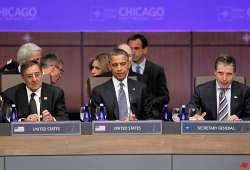Obama opens NATO summit focused on Afghanistan
Chicago, May 21: US President Barack Obama warned of challenges ahead in Afghanistan as world leaders opened a NATO summit in Chicago on Sunday.But alliance leaders insisted the fighting coalition would remain effective despite France's

Chicago, May 21: US President Barack Obama warned of challenges ahead in Afghanistan as world leaders opened a NATO summit in Chicago on Sunday.
But alliance leaders insisted the fighting coalition would remain effective despite France's plans to pull combat troops out early.
“Just as we've sacrificed together for our common security, we will stand united in our determination to complete this mission,” Obama said.
With a global economic crisis and waning public support for the war as a backdrop, world leaders were confronted by questions about Afghanistan's post-conflict future: money for security forces, coming elections and more.
Some cautioned against following France's example, while others played down divisions within the alliance.
NATO Secretary General Anders Fogh Rasmussen said the summit would “renew our commitment to the vital bond between Europe and North America in the 21st century, to re-affirm our determination to defend our freedom and security and protect our shared values, because in a fast-changing world, we remain each others' indispensable partners.”
Meanwhile Obama said, following an earlier meeting with Afghan President Hamid Karzai, that the end of the war was in sight.
The military alliance has promised to remain in Afghanistan into 2014, but will seal plans on Sunday and Monday to shift foreign forces off the front lines a year faster than once planned.
Afghan forces will take the lead throughout the nation next year, instead of in 2014, despite uneven performance so far.
The shift is in large part a response to plummeting public support for the war in Europe and the United States, which contribute most of the 130,000 foreign troops now fighting the Taliban-led insurgency.
A majority of Americans now say the war is unwinnable or not worth continuing.
“Over the next two days we'll meet, first as allies, and then with President Karzai and our international partners, to chart the next phase of the transition in Afghanistan,” Obama said.
Newly-elected French President Francois Hollande has said he will withdraw all French combat troops from Afghanistan by year's end - a full two years before the timeline agreed to by nations in the U.S.-led NATO coalition.
Hollande's stance was facing some resistance.
While Afghanistan is dominating the summit, NATO is also struggling with age-old tensions over relatively low defence spending in some European countries.
The alliance is also expected to announce progress in its European missile defence system.
That will allow it to begin countering some missile threats, though the system is not scheduled to be fully operational until 2022.
The Obama administration has touted the progress as sign of alliance solidarity.
But it is mainly paid for and operated by the United States.
Joining Obama and many of the G8 leaders in Chicago are the heads of NATO alliance nations and other countries with a stake in the Afghan war.
But alliance leaders insisted the fighting coalition would remain effective despite France's plans to pull combat troops out early.
“Just as we've sacrificed together for our common security, we will stand united in our determination to complete this mission,” Obama said.
With a global economic crisis and waning public support for the war as a backdrop, world leaders were confronted by questions about Afghanistan's post-conflict future: money for security forces, coming elections and more.
Some cautioned against following France's example, while others played down divisions within the alliance.
NATO Secretary General Anders Fogh Rasmussen said the summit would “renew our commitment to the vital bond between Europe and North America in the 21st century, to re-affirm our determination to defend our freedom and security and protect our shared values, because in a fast-changing world, we remain each others' indispensable partners.”
Meanwhile Obama said, following an earlier meeting with Afghan President Hamid Karzai, that the end of the war was in sight.
The military alliance has promised to remain in Afghanistan into 2014, but will seal plans on Sunday and Monday to shift foreign forces off the front lines a year faster than once planned.
Afghan forces will take the lead throughout the nation next year, instead of in 2014, despite uneven performance so far.
The shift is in large part a response to plummeting public support for the war in Europe and the United States, which contribute most of the 130,000 foreign troops now fighting the Taliban-led insurgency.
A majority of Americans now say the war is unwinnable or not worth continuing.
“Over the next two days we'll meet, first as allies, and then with President Karzai and our international partners, to chart the next phase of the transition in Afghanistan,” Obama said.
Newly-elected French President Francois Hollande has said he will withdraw all French combat troops from Afghanistan by year's end - a full two years before the timeline agreed to by nations in the U.S.-led NATO coalition.
Hollande's stance was facing some resistance.
While Afghanistan is dominating the summit, NATO is also struggling with age-old tensions over relatively low defence spending in some European countries.
The alliance is also expected to announce progress in its European missile defence system.
That will allow it to begin countering some missile threats, though the system is not scheduled to be fully operational until 2022.
The Obama administration has touted the progress as sign of alliance solidarity.
But it is mainly paid for and operated by the United States.
Joining Obama and many of the G8 leaders in Chicago are the heads of NATO alliance nations and other countries with a stake in the Afghan war.